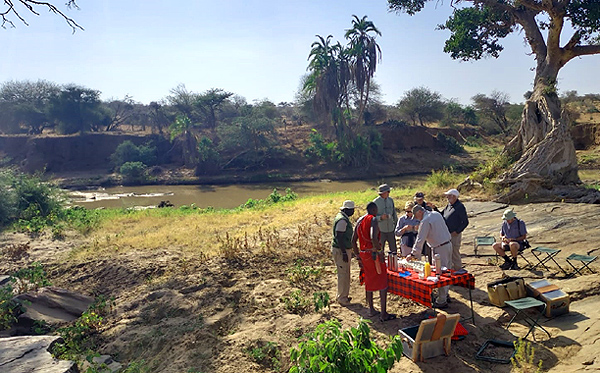 As beautiful as the unwild can be.
As beautiful as the unwild can be.
Breakfast on the Ewaso Nyiro. About 10:30a. We left camp four hours ago and almost immediately saw two very young hyaena suckling.
I was anxious to find one of my all-time favorite birds, the golden-breasted starling, but dozens of regular and Grevy’s zebra, many giraffe, elephant, lots of impala and warthog along with a roster of exotic, colorful birds were sufficient substitutions.
Then we came upon a lion family. The young male, nonetheless sporting one of the most magnificent black manes I’ve seen – it stretched all the way under his chest onto his belly – led us reluctantly to his two females.
Our experienced camp driver knew the whole history of the family. Once a larger pride with two pride-masters, it had broken up for some reason with the birth of the most recent cubs.
The cub’s mother was crunching the last of a dik-dik. That’s peculiar that a lion would deign to expend any energy at all on a 10-pound miniature antelope. But we’re in Kenya’s north where – according to the billboard greeting guests into Samburu National Park – a place where “Nature Defies Itself.”
Even more peculiar was the fact that her sister and the pride master didn’t try to muzzle into the little kill to get a share. They let her alone, not something lions are wont to do. Did they know how important it was to raise those three cubs?
Lions are in serious decline and nowhere is this more evident than in the Northern Frontier. Ransacked by climate change, an unusual 3-year drought just broke a few months ago, but it will take several more robust rainy seasons to bring the veld back to what it was pre-Covid.
Meanwhile the lions eat dik-dik, which in contrast to so many of the better known, larger animals of the veld, are actually increasing in population.
This is our third day at Loisaba, an extremely lovely private reserve on the western and northern borders of the Ewaso Nyiro River. The southern ranges of the Ewaso include lots of wild and undeveloped lands, including Samburu National Park, but the northern where we are, are exclusively huge private reserves.
The difference is very evident to me. It’s much less wild. But my clients love it – as they should – for the exclusiveness of being the only ones in 57,000 acres. To me the problem is that too much is managed too carefully:
Water sources in the great Northern Frontier are drying up. So private reserves dig boreholes. These regularly refreshed fresh water ponds have no time to mature with the natural grasses and algae that define a natural pond.
So the roster of natural insects doesn’t develop, so the bird life and aquatic life and even amphibian life all in that beautiful matrix of wild Mother Nature I’ve come to expect here is starkly absent.
Less than a decade ago a huge fire took out nearly half the reserve. That’s plenty of time for regeneration but in this case the managed nature preceding the fire resulted in an unnatural regeneration and today huge portions of the reserve are dominated by prickly pear cactus.
Prickly pear have always been around. They are an essential drought food for animals like elephant, baboon and beisa oryx. And climate change has thrust more droughts on this beautiful area. But the domination in the private reserves is far greater than in the national parks.
This area is truly one of my favorite places in Africa, even when stressed. But the market intuitively knows that the awesome magic of Africa has diminished here, that the wild is in visible decline.
So these massive private reserves – almost a dozen of them clustered in this area known as Laikipia and each around 50,000 acres – concentrate on comfort, cuisine, views and high levels of service, all which command very high prices.
Just give me a rocky hill less disturbed by man’s meddling. Plenty still exist in Kenya’s Great Northern Frontier, and none to equal Samburu National Park.
I’m not suggesting it’s suburbia in the private reserves where we are now, but it’s a far cry from the terrors and beauties of wilder Africa.